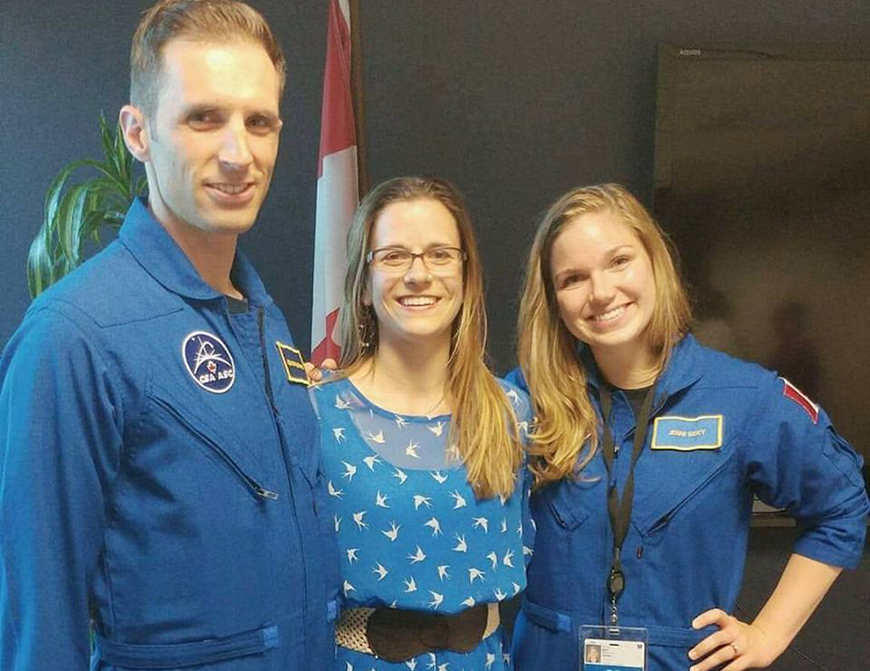
During her internship at the Canadian Space Agency, nutrition and food science student Tanya Mireault (centre) met Canada's newly named astronauts Joshua Kutryk and Jennifer Sidey.
For the second year in a row, a top nutrition and food science student trained at the University of Alberta is the intern developing the foods eaten by Canadian astronauts on the International Space Station.
Tanya Mireault, who is in her last year of nutrition and food science in the Faculty of Agricultural, Life and Environmental Sciences, has just completed a one-year post as space food and nutrition intern at the Canadian Space Agency. Hope Kurylo, a fellow undergrad in the same program, started the internship at the agency's headquarters outside of Montreal in September.
The agency chose two ALES students over those from several other institutions,because of their broad education, and for the work experience in food science and nutrition they accumulated while earning their degrees, said Natalie Hirsch, a project officer in operational space medicine at the Canadian Space Agency.
"They had completed a range of courses in nutrition and food science, with both theoretical and practical and laboratory components, that are relevant to providing food in space- in particular food safety and quality assurance, and fundamentals of nutrition," said Hirsch.
For Mireault, the internship was a one-of-a-kind job experience.
"You don't realize how many different moving components are involved in such a large project as sending astronauts up to the ISS, so it's been incredible to see all the small details and the collaboration going on," she said.
"That will benefit me greatly in terms of future employment, having a handle on working on such a massive project."
For Kurylo, "it's hard to express how exciting this is. It's amazing to be part of this experience, and I'm looking forward to continuing the work that Tanya started."
Mireault started by setting up a testing lab to prepare a "crew-specific" menu for Canadian astronaut David Saint-Jacques, whose flight is scheduled for 2018. Crew-specific menus are one of three categories of food eaten aboard the space station, and consist of a limited quantity of items requested by the astronauts themselves.
The other two categories include the basic menu of breakfast, lunch and dinner supplied by NASA (the National Aeronautics and Space Administration, one of five participating space agencies at the space station), and crew packages. The latter are put together by the astronauts' families, who often insert favourite snacks or sentimental items.
Mireault sourced commercially produced versions of the items Saint-Jacques requested, and then ensured they met all the criteria for going into space.
"They have to have a shelf life of 18 months because there isn't any refrigeration on the ISS," she said. "They can't be fragile or crumbly or too liquidly, because that can cause quite an issue in micro-gravity. They have to have a relatively low sodium factor, because they eat a lot of dehydrated food and high sodium can cause issues with calcium absorption and increases the risk of kidney stones."
Astronauts must be able to consume the food right out of its container, and because human sense of taste is weakened in space, Mireault chose foods that are extra flavourful here on Earth.
"With no gravity, a lot of fluid builds up that can plug the nostrils and that ultimately leads to decreased taste," said Mireault.
She also tested how plastic or hydrofoil packs are warmed in a conductive oven, as is done on the space station.
Another important responsibility Mireault held was sitting in for her supervisor a number of times, as the Canadian Space Agency's representative during teleconference calls with the European Space Agency, and those of Russia and Japan. In those calls, team members discuss food nutrition and update each other on their project's progress.
Now that Mireault has finished prepping Saint-Jacques' menu (which included requests for smoked salmon and maple syrup, and special patés meant to be shared with astronauts from other countries), Kurylo will be responsible for the paperwork.
She will document that all of the Canadian Space Agency supplementary foods meet NASA guidelines and can pass through customs without issue, and flag those that are problematic. In the lab, she will be optimizing the water-to-dehydration ratio of foods.
"Our program was tailored for these kinds of jobs," said Kurylo.
Nutrition and food science students interested in next year's internship can learn more from the University of Alberta Career Centre's job posting.